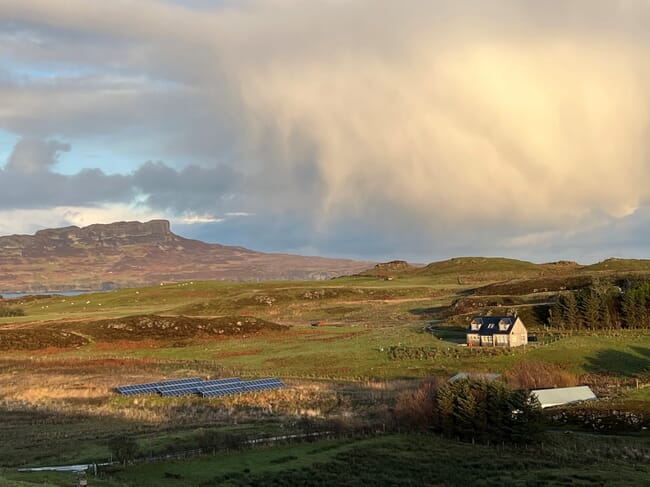
This house was built for the farm manager on the Isle of Muck © Mowi Scotland
Trade body Salmon Scotland launched a campaign last year to overhaul the current system so that the millions sent to Crown Estate Scotland in Edinburgh are instead directly ringfenced for coastal areas where farms operate. This would echo the system in Norway, where rents are used to benefit local communities.
Mairi Gougeon, Cabinet Secretary for Rural Affairs, Land Reform and Islands, has now confirmed the government is open to the revenues being used to support housing, when responding to questions at the Scottish Parliament’s rural affairs and islands committee on 10 May.
Rhoda Grant, MSP for Highlands and Islands, highlighted how the lack of available, affordable housing is affecting the ability of people to live and work at local salmon farms.
She said young people “are really struggling to a get home” and asked what the government was doing to help them and what work it was doing with the sector.
Rachael Hamilton, MSP for Ettrick, Roxburgh and Berwickshire, also raised the issue and asked if the government supported Salmon Scotland’s call.
Gougeon pointed to existing agreements with local authority body Cosla, adding: “I of course welcome any suggestions and happy to consider that.”
Reallocation of rents
According to Salmon Scotland, the country’s licensing regime and planned rent hikes means that more than £20 million per year is soon expected to be paid by salmon farmers to various regulators and quangos.
At present, salmon farming contributes more than £5 million directly to Crown Estate Scotland (CES) – more than a fifth of the quango’s revenues – with this fee set to nearly double. Net CES revenues are currently handed to the Scottish Government and redistributed across the country, but Salmon Scotland believes that a greater share of aquaculture contributions should be ringfenced to support coastal communities.
The trade body is therefore calling for government reform to ensure that around £10 million is reinvested in rural communities, with a particular focus on housing.
As Tavish Scott, chief executive of Salmon Scotland, said in a press release: “We are pleased to see that MSPs and the Scottish Government are acknowledging the importance of addressing the housing crisis in our coastal communities. The lack of available and affordable housing has been a pressing issue, impacting the ability of people to live and work in these areas. We are encouraged by the government's open-minded approach and their recognition of the need to support coastal communities.
"Reinvesting the funds generated through salmon farm rents directly back into these communities will have a transformative impact, particularly in addressing the housing challenges faced by local residents. By working together, we can drive positive change, ensure sustainable growth of the salmon sector, and make a lasting impact on the communities we serve.”



